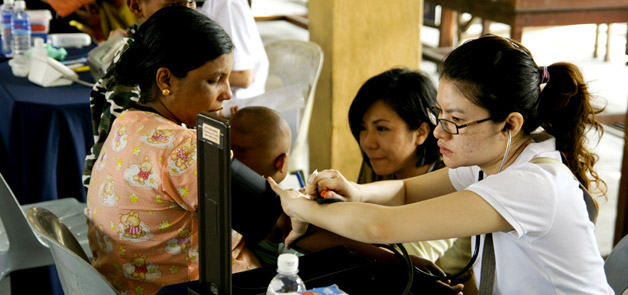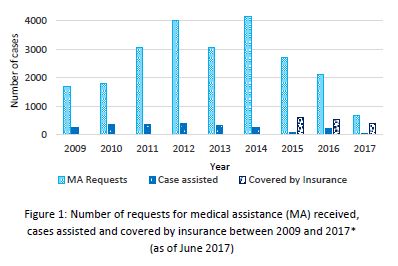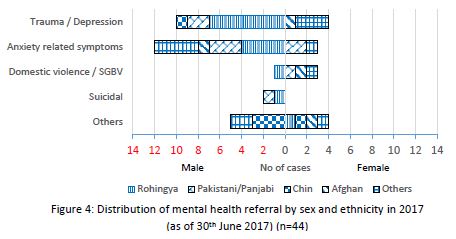Public Health in Malaysia
Public Health in Malaysia
The 1951 Refugee Convention states that refugees should enjoy access to health services equivalent to that of the host population, while everyone has the right under international law to the highest standards of physical and mental health.
In Malaysia, while refugees are able to access public and private healthcare facilities, this is often hindered by a variety of factors including the cost of treatment, fear of moving in public in order to access those services, and language barriers.

UNHCR works closely with partner organizations who implement health programmes in a range of challenging settings. We play a planning, coordination, monitoring and evaluation role. Health and nutrition programmes are delivered within a public health and community development framework, with an emphasis on primary health care and support for secondary hospital care. The objective of these programmes is to minimize mortality and morbidity rates.
The refugee agency plans its health care interventions based on needs, risks and vulnerabilities, which are determined as part of an inter-agency assessment by a competent health and nutrition partner and/or UNHCR staff, together with refugee communities.
Highlights
|
92.9% Refugees were able to access primary healthcare services. |
29,637 Individuals accessed primary healthcare at clinics run by NGO partners in 2017. |
23,113 Individuals enrolled under the Refugee Medical Insurance Scheme (REMEDI) |
10 Outreach visits to various government hospitals for advocacy and rapport building |
Strategic objectives and outputs
Optimise utilization of primary care:
- Explore partnerships with private sector for provision of primary care.
- Effective information dissemination on available primary care services.
- Improve quality of care and services through capacity building of partners.
Promotion of health insurance for access to secondary and tertiary care:
- Ownership and promotion of the scheme office wide as a social protection tool.
- Identify extremely vulnerable cases that would benefit from UNHCR support when resources are available.
- Community mobilization to promote enrolment.
Provide targeted medical assistance through enhanced partnerships:
- Disengagement from direct implementation - MDR-TB, HIV programme and second line assistance .
- Refugee Welfare Fund – Support NGOs for fundraising initiatives and develop their capacity to maintain assistance to persons with specific needs with minimum UNHCR financial involvement.
- Explore conditional cash transfers for specific cases.
Developing self-reliance for refugees with special needs:
- Assistance towards self-reliance - Referral to Livelihood, Cash-Based Intervention, Job matching, Skills training.
- Negotiate/import cheaper drugs for HIV.
- Community-based programme for health education.
Monitoring of access to health services:
- Regular surveillance through Health Access and Utilization Survey to strengthen evidence-based programming.
Primary healthcare
92.9% managed to access primary health care services when needed. Over 16,030 consultations were provided in our partner clinics from January 2017.
32,410 individuals accessed primary care with our implementing partner clinics in 2016.
Main barriers to primary health care:
- 50.0% - Can hardly afford user fees
- 16.7% - Transportation issues
- 33.3% - Health care centers refused services primarily due to payment issues
Refugee medical insurance
23,113 individuals (12.2% of UNHCR cardholders) were enrolled under 9,919 policies in the Refugee Medical Insurance (REMEDI) under RHB Insurance and UNHCR.
Since January 2017:
- All government hospitals in Peninsular Malaysia have been briefed on REMEDI online system.
- 14 mobile enrolment campaigns have been conducted to reach out to the community members.
Medical assistance (MA)
1077 requests for medical assistance received as of June 2017. 89 cases were prioritized and 50 cases were assisted.
In 2016, 2,119 requests were received of which 368 were prioritized and assessed and 230 provided with interventions in the form of :
- enrolment in insurance
- direct support for hospital bills
- referral for Cash Based Initiatives
- referral prioritized RSD/RST procedures
REMEDI has enabled 402 individuals with medical condition to receive the care they require in 2017.

HIV/AIDS
- 311 refugee individuals living with HIV (61.3% male, 38.7%)
- 197 HIV patients on treatment (58.9% male, 41.1% female)

Mental Health
Mental health referral is done primarily to NGO partners, namely A Call To Serve (ACTS), Health Equity Initiatives (HEI) and Malaysian Social Research Institute (MSRI).
Since January 2017, 59 referrals have been made:
- 35 males, 24 females
Types of interventions include:
- Counselling
- Psychotherapy
- Referral to psychiatric care

Partners
- UNHCR Malaysia currently works with A Call To Serve (ACTS), Buddhist Tzu Chi Foundation, Malaysian Social Research Institute (MSRI) to implement primary care services for refugees and asylum seekers.
- ACTS also runs a 35-bed nursing home for refugees requiring convalescent care.
- Positive Living Community provides nursing care for refugees living with HIV and shelter services for other medically vulnerable refugees.
- Health Equity Initiatives provides community based mental health interventions and professional mental health services.
- MERCY Malaysia provides catch-up vaccination projects for refugee children.
- Other partners include MSF, Federation of Reproductive Health Association of Malaysia (FRHAM), International Organization for Migration (IOM), Migrant Ministry of Klang.
Challenges
- Access to public health facilities have become highly unaffordable for refugees with the 100% increase of foreigners’ rates.
- Language and security issues when accessing health care remains a big challenge for refugees.
- Level of knowledge on disease prevention and health promotion remains low with limited resources for preventive measures.
- Low enrolment rate for REMEDI medical insurance.

